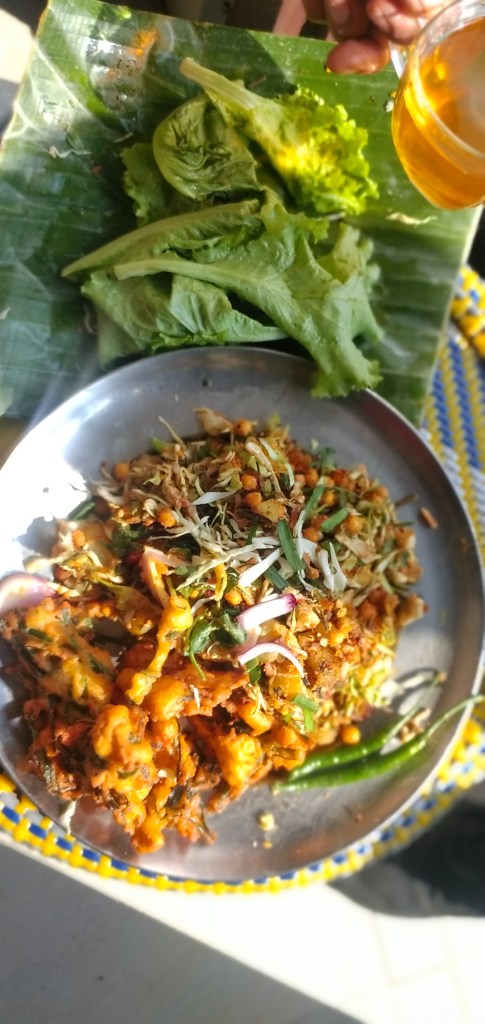As Manipur stews, Indian foodie Samy Lal, gives us a taste of what’s cooking

Eeru tanaa lonba is literally translated “mixing and stirring watery” in Meiteilon, the language of the majority Meitei community and the lingua franca in Manipur. That’s the root phrase for what is Eromba, a mishmash of steamed vegetables and fermented fish without which a Manipuri meal is incomplete.
Manipur, as you well know, is a state in north-eastern India constituting a valley surrounded on all sides by variegated hills. The tiny state is known for its good food, humour all across and of course now, for a blind temper capable of self-destruction.
But let’s get to the food and be at the table to see what’s happening to our recipe.

First see the ingredients, and some of them are just too important to be missed out. The most important perhaps are these four: potatoes, umorok or the fiery king chilli from the hills, yongchak or jonghla that’s stink beans (Parkia speciosa) and last but not the least, ngari which is sun-dried punti fish fermented by seasoned Manipuri hands in huge earthen pots. Ngari is a typically Manipuri preparation that few outside can replicate outside.
The other ingredients of the Eromba are banana stem, banana florets, tomatoes, coriander and local herbs.
The vegetables and even the ngari are steamed first and then mashed into a watery stew that, had with local Manipuri rice and ooti along with fish curry is heavenly.
Parkia speciosa is the latin name for stink bean or bitter bean, called yongchak in the Meitei language or jonghla in Thadou. Meiteilon is the language of the majority Meitei people of the Imphal valley and Thadou the language of the Kuki tribals in the hills.
The beans are available dried rest of the year and during the dry winters one can see bunches of these crooked fresh green beans sold on the roadsides, mainly across Manipur. At the border town of Moreh, traders deal in tonnes of yongchak imported from neighbouring Myanmar that satiate the hefty appetite for these beans in Manipur.
For centuries, whether during peacetime or ethnic strife among the different communities, the Eromba was unshaken. It was almost like this mishmash – mixed well by hand – was a thread of life, inextricably linked to the way of life in Manipur’s valley and hills.
May it be the majority Meiteis in the valley or the Nagas and Kukis in the hills, no one could resist the taste, flavour and texture of this side dish that could bring a smile on the faces of a Manipuri. No palate is left unseduced by the unique blend of the delicately measured pungency of the ngari, the crunchy texture of the yongchak over the softness of mashed potatoes or banana stem, punctuated by an elusive herby flavour and dressed up by the hot zing of umorok.

Shockingly, something’s gone wrong in the past 75 days. There’s a violent struggle over and within this unique mishmash. Some ingredients accuse the ngari is unnecessary while the other is saying the yongchak may well live aside; the arrogant potato feels it can live on its own while the umorok feels its heat cooks the recipe to its final delicious end. Hot and bland and hot and stinky, these characters seem to have been misled into thinking that they can exist without the other. In fact, there are those who are encouraging this and perhaps watching which abyss the deliciously sloppy stuff will slowly flow into. As these indubitably unique ingredients bleed each other out, they may as well peep into their souls.
One part of the ngari knows its existence and interdependence, so does the yongchak and so do the umorok and potato.
The winter of 2023 will test their resilience. It will check out if they want to be this uniquely blended Eromba that the world looks up to, or just plain mashed potatoes to be scoffed at.
Next in line for the recipes, was the singju a veritable mix – again, mixed well by the hand – of green raw herbs, ngari and vegetables peppered with fried peanuts and peas that is also popular street food. Sadly, the last we heard was that the powdered dry peas, cabbage and coriander were consumed by gunpowder. In Manipur, this recipe is also a colloquial phrase for a big mess. Clearly, singju is in a big singju.
Categories: Food











